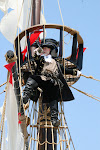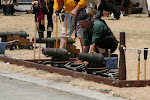
Illicit Business: accounting for smuggling in mid-sixteenth-century
Jones’ contention, well argued in the paper, is that almost all smuggling in
Some common goods:
- Wine, Iron, Lead, Cloth, Wheat, Hides, Calfskin (dozen = 1 hide for license)
Some common rates:
Hides: (prohibited export)
- 40-50 s per dicker; tax 4s / dicker; license could be 60% cost or 25-30s/dicker
- 1540 price 44s/d license 13s 4d/dicker
Grain (wheat) (prohibited export)
- 1541 prices 8s/ quarter; license 5s/q tariff 2s/q a 100 quarter wheat license cost L25
Export profitability for grain rose after mid-century as continental prices outstripped
Crown agent, Customs Searcher, Customer
Cocket – receipt for customs duties paid
Charter party – shipping contract
Corn – refers to barley corn, not maize
Dicker – 10 hide count for leather cargo
Frauds – smuggling and associated falsifications*
Quarter – unit of measure for grain (8 bushels, wheat weighs about 60#)
Prohibited or banned export – requires a license
Export license – granted for favors to the crown, transferable.
Montith – amounteth: the amount or sum
Owith- owed
Wey – 6 quarters (grain)
*One fraud example from the paper centers around prohibited exports and ran like this: Smythe bought a wheat export license for 100 quarters of wheat, and laded 100 quarters through the customs house. He also bribed the customs searchers not to check his ship again after the customs house. He also laded hides, another prohibited export, without license, plus an additional 400 or so quarters of wheat at an anchorage up the river a bit. So, he had wheat and license and duties paid on the customs books so the customs agents looked like they were doing their job, but pocketed license fees and duties on the hides and 80% of the wheat.
It was apparently not uncommon for the well-connected, ship-owning merchants to have relationships with suppliers who would be willing to load cargo from boats at unapproved anchorages to avoid the customs house. You basically had to be in control of a ship to arrange this because there was no way to have an enforceable charter party (shipping contract) for the illegal activity. You also had to have a trusted “relationship” with the customers to arrange that your ship would not be boarded and searched later, as that was the standard operating procedure for verifying duties and licenses.






No comments:
Post a Comment